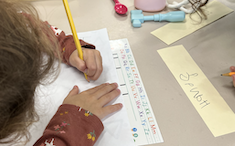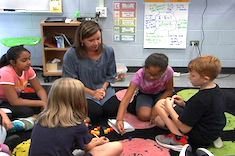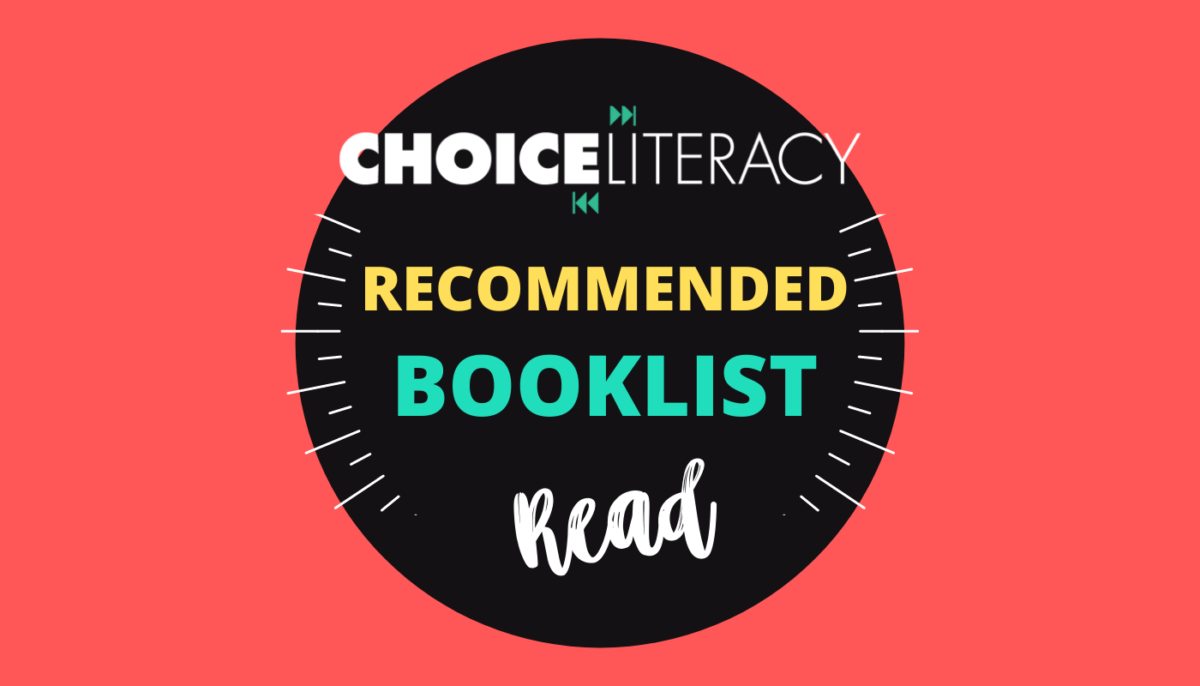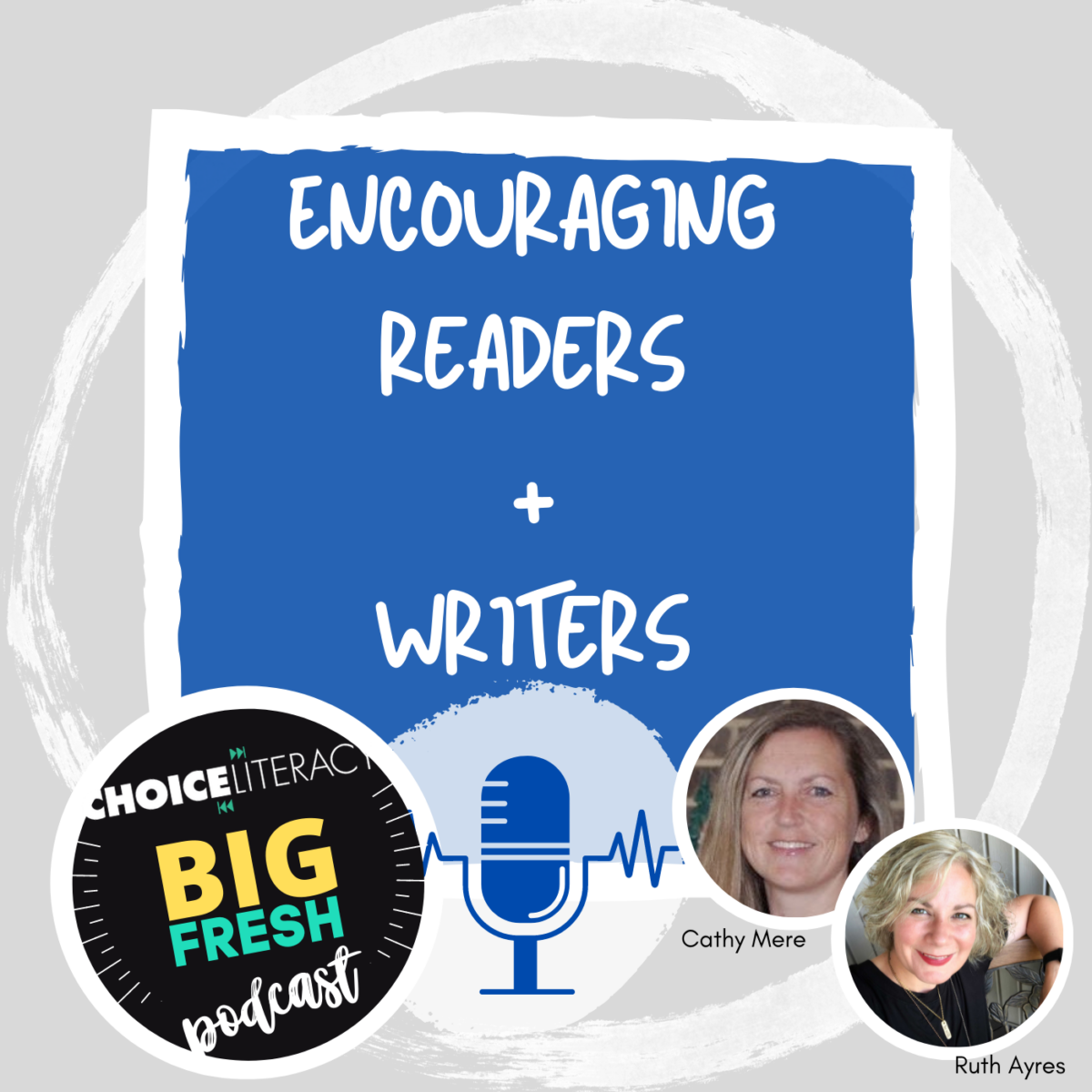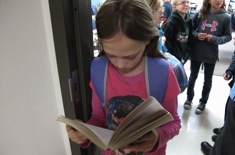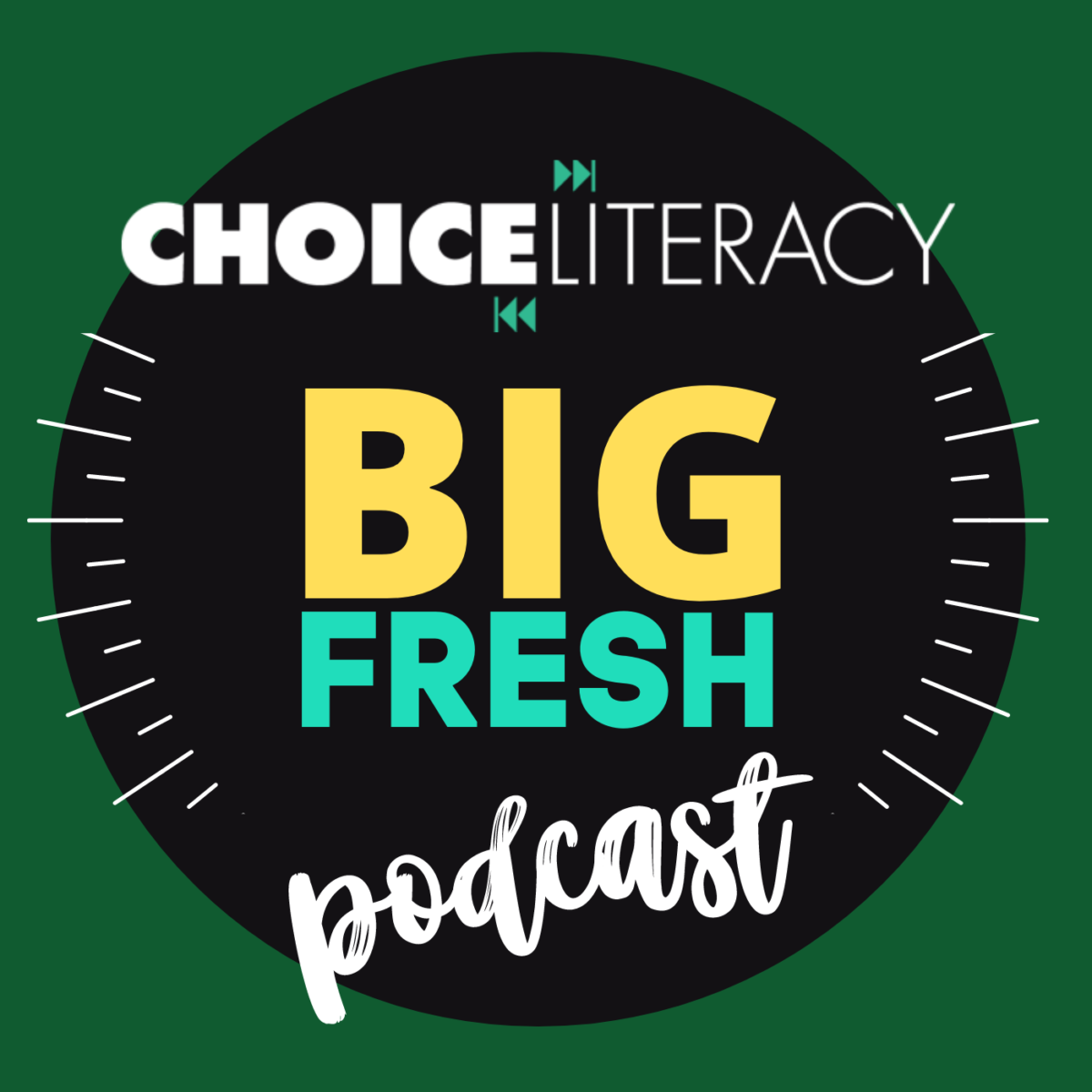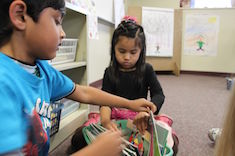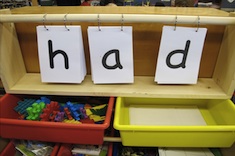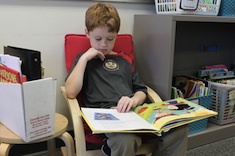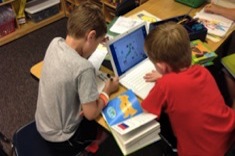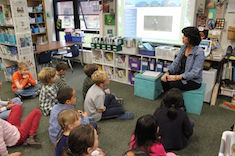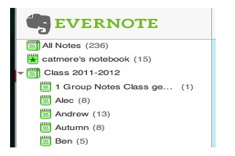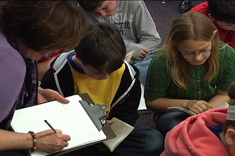Cathy Mere
Cathy Mere has taught grades K-6 and worked as a literacy coach and a Reading Recovery teacher in Ohio. Currently she works as a reading specialist supporting literacy learners. Cathy is the author of More Than Guided Reading. She shares her professional reflections at Reflect and Refine: Building a Learning Community and dabbles in poetry and personal essay at Merely Day by Day. Cathy can be found @cathymere on Twitter.
Latest Content
When They’re Hard to Teach
Cathy Mere reminds us of the complexities of teaching readers, especially those who are in intervention. She shares the “rules” she’s put in place for herself when a rough patch is hit and little growth is gained.
Teaching Writers to Hear Feedback
Cathy Mere outlines ways writers can position themselves to hear (and use) feedback.
Helping Writers Self-Correct
What to do with writers who catch errors in isolation but not in their own writing? Cathy Mere suggests three ways to help students self-correct their writing.
November 11, 2022: Stronger Conferences and Feedback
This week’s newsletter is about engaging secondary students.
Reading Specialists Can Change the Narrative
Cathy Mere shares ways reading specialists can help teachers get excited about striving readers’ growth by intentionally sharing progress and celebrations.
Bring Me Something Funny (Booklist)
Cathy Mere offers a booklist in response when a teacher asks her to “Bring me something funny.” These books are sure to fill your classroom with lighthearted laughter.
Rehearsal for Writers Podcast
Cathy Mere and Ruth Ayres discuss student-led learning on the podcast.
Making Data Personal Podcast
Cathy Mere and Ruth Ayres discuss student-led learning on the podcast.
Student-Led Learning Podcast
Cathy Mere and Ruth Ayres discuss student-led learning on the podcast.
Feedback to Writers (Part 2) Podcast
Cathy Mere and Ruth Ayres discuss feedback to writers on the podcast.
Encouragement for Readers and Writers Podcast
Cathy mere and Ruth Ayres discuss building connections beyond the classroom.
Building Connections Beyond the Classroom Walls Podcast
Cathy mere and Ruth Ayres discuss building connections beyond the classroom.
The Classroom Library: Building Bridges
Cathy Mere presses to help children take the first steps in growing a sustainable reading life that carries beyond the classroom walls. She offers ways to build bridges to the school and public libraries as an essential step.
Assessing Readers Podcast
Cathy Mere and Ruth Ayres discuss assessing readers.
October 1, 2021: Assessing Readers
Assessing readers is the theme of this week’s newsletter.
Using Picture Books Podcast
Cathy Mere and Ruth Ayres discuss using picture books in literacy instruction.
Making Workshop Work Podcast
Cathy Mere and Ruth Ayres discuss making workshop work.
The Choice Literacy Book Club Discusses Ouch! Moments
The Choice Literacy Book Club discusses Ouch! Moments: When Words Are Used in Hurtful Ways by Michael Genhart and Viviana Garofoli.
How Do Visuals Strengthen Literacy Instruction? Podcast
Cathy Mere and Ruth Ayres discuss the new content related to the way visuals strengthen literacy instruction.
Supports for Our Youngest Writers
Cathy Mere identifies ways to support our youngest writers.
Finding Reliable Digital Reading Resources
Cathy Mere shares how to find reliable digital reading resources to pair with print materials to provide strong opportunities for student learning.
Beyond Personal Narrative: A Change in Perspective
Cathy Mere nudges us to consider perspective as a craft move and provides a stack of mentor texts in this booklist.
Build Reader Identity
Cathy Mere knows that growing skills and strategies readers need is essential, yet helping readers find and grow their identity as readers makes the biggest difference of all.
Poetry Resources for Remote Learning
Poetry can be the glue that holds many virtual classroom communities together. It works for quick morning meeting openings, transitions, or even a bit of laughter when energy is flagging. Cathy Mere shares her favorite poetry resources for remote learning.
Book Selection for Early and Emergent Readers
Some emergent readers happily browse for books and explore them independently. For others, it’s a struggle. Cathy Mere shares her favorite strategies for helping all readers get comfortable with selecting books on their own.
Raising Student Voices: Mentor Texts
Helping students find and raise their voices so that they can someday change the world is one of the most important things we do. Cathy Mere shares some of her favorite mentor texts for this essential work.
Managing Take-Home Books
Sending books home with young readers is essential. Cathy Mere gives lots of practical tips for designing a take-home books program and communicating with families about what young readers need.
Fewer Books and More Options at the End of the Year
Cathy Mere considers the dilemma teachers face when the bookroom, library, and tech departments require books and devices to be returned late in the year . . . but there are still a few weeks of school. She shares many suggestions for fostering literacy and community when there are far fewer books in the room.
They Don’t Read at Home
Cathy Mere suggests strategies for working with struggling students who read very little at home.
Reading Ambassadors
Cathy Mere finds that a Reading Ambassadors program pays big dividends in building confident and conversant young readers.
Thinking About Fluency
Cathy Mere finds that with young learners, not all issues with fluency are created equal—different needs require different strategies.
Building Word Learning Routines
Cathy Mere shares tried-and-true strategies for word learning with struggling young learners.
Growing Toward Independence
Cathy Mere shares what to look for and what to try next with young learners who are easily distracted and struggling to concentrate during independent reading.
Supporting Readers with Nonfiction Text
Cathy Mere finds that criteria for “just-rightness” varies with genre.
Small-Group Writing: Steps for Success
Cathy Mere provides grouping guidelines for primary teachers.
Reader Response: Keeping It Real
Cathy Mere finds many authentic ways for her first graders to share reading insights.
A Closer Look at Engagement
Are the terms stamina and engagement synonymous? Cathy Mere defines the terms by observing her first graders.
Shared Blogging in the Primary Classroom
Shared reading and shared writing are essential instructional techniques in the primary grades. How about shared blogging for teaching children basic blogging skills? Cathy Mere describes how it works.
Mentor Texts for “Versus” Stories
Shark vs. Train! Fork vs. Spoon! Versus stories are incredibly popular in writing workshops these days. Cathy Mere found herself struggling to teach narrative conventions to students writing versus tales, so she created a booklist of mentor texts.
Kidwatching and Connections in the Early Days
Cathy Mere finds the early days of school are all about kidwatching and connecting with her first-grade students during reading and writing workshops. She shares some terrific guiding questions that might also help new teachers hone their observation skills.
Staying Connected with Students All Summer Long
Cathy Mere explains how she uses technology to stay in touch with students and families over the summer.
Formative Assessment: Wall Displays and Conversations in First Grade
Formative assessments are always a priority in classrooms. Cathy Mere explains how she uses a classroom wall display and conversations to highlight strong writing and help her first graders learn to assess improvements in their work.
Capturing Student Learning with Evernote
It can be difficult to move from print to electronic records in the classroom. After using a spiral notebook for 10 years, Cathy Mere did just that.
Guided Reading in Perspective
Cathy Mere puts guided reading in perspective, explaining how it works as one piece of the puzzle when it comes to fostering a lifelong love of reading in students.
Books Struggling Readers Can and Will Want to Read: Building the Classroom Library
Sammy is an avid reader in the classroom, but his teacher Cathy Mere notices he “accidentally” is always leaving the backpack with his intervention books behind. The challenge for classroom teachers is stocking books with titles that will interest Sammy, but still provide enough challenge and support to move him forward as a reader.
Assessment Beyond Levels: The Reading Grid
Is there a great divide in your classroom between numerical data from assessments and your anecdotal notes? Cathy Mere bridges the gap with her class reading grid, a nifty tool for recording and analyzing a whole classroom’s worth of student assessment data on one page. A template is included.
Countdown: Keeping Children at the Center of My Plans for the New Year
Cathy Mere reminds us that the excitement of facing new students is always tempered and enriched by the lessons from last year’s students that we carry with us.
Browse Content By
Type
Category
- Assessment Tools
- Big Fresh Archives
- Booklists
- Choice Numeracy
- Classroom Design
- Common Core
- Community Building
- Conferring
- Content Literacy
- Digital Literacy
- English Language Learners
- Equity
- Family Relations
- Free Samples
- Guiding Groups
- Leadership
- Literacy Coaches
- Mentor Texts
- Minilessons
- New Teacher Mentors
- Podcasts
- Poetry
- Quote Collections
- Reading Strategies
- Self Care
- Struggling and Striving Learners
- Talking and Listening
- Teacher Study Groups
- Teaching Reading
- Teaching Writing
- Word Study and Vocabulary
Author
- Melissa Quimby
- Nawal Qarooni
- Gwen Blumberg
- Julie Cox
- The Lead Learners
- Hannah Tills
- Josie Stewart
- Ruth Metcalfe
- Mallory Messenger
- Becca Burk
- Jodie Bailey
- Vivian Chen
- Mary Brower
- Tiffany Abbott Fuller
- Stephanie Affinito
- Ruth Ayres
- Leigh Anne Eck
- Heather Fisher
- Shari Frost
- Julie Johnson
- Suzy Kaback
- Gigi McAllister
- Shirl McPhillips
- Melanie Meehan
- Cathy Mere
- Debbie Miller
- Tara Barnett and Kate Mills
- Tammy Mulligan
- Dana Murphy
- Bitsy Parks
- David Pittman
- Brenda Power
- Heather Rader
- Matt Renwick
- Mandy Robek
- Christy Rush-Levine
- Gretchen Schroeder
- Jen Schwanke
- Brian Sepe
- Katherine Sokolowski
- Stella Villalba
- Jennifer Vincent
Grade Level
Choice Literacy Membership
Articles
Get full access to all Choice Literacy article content
Videos
Get full access to all Choice Literacy video content
Courses
Access Choice Literacy course curriculum and training



